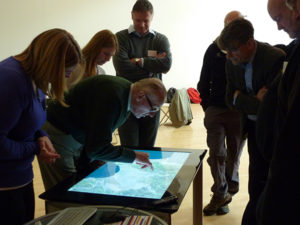This has been a summer of socio-economics for CBESS, with the second recreational stakeholder workshop being held in Barrow-in-Furness in May. The workshop was ran in collaboration with the Morecambe Bay Partnership, who found us the amazing Art Gene venue and did an excellent job of recruiting participants and promoting the event. Representatives from multiple recreational sectors attended from around the Morecambe Bay area and helped us understand how they use the bay recreationally.

Now, with both Essex and Morecambe workshops completed, we will be exploring the results and seeing if we can identify any interesting relationships between biodiversity and recreation in salt marsh and mudflat habitats. Read more about the workshop here.
Impressive efforts in the processing of Tillingham data were rewarded in June with the successful meeting of the Data Analysis Working Group (DAWG) in Essex. Having an almost complete dataset for one of the study sites enabled the group to start exploring the data and discussing options for analysis. The main goal now is to continue with the processing of the remaining data and explore any emerging patterns as they develop.
In other news, PhD student Lydia Bach and the rest of her team from Queen’s University Belfast have been busy collecting data from sites around Northern Ireland. Read her update here. Martin Solan, Cristina Wood and Jasmin Godbold of Southampton University will be representing the consortium at the forthcoming World Conference on Marine Biodiversity in China, along with members from University of St Andrews and Queen’s University Belfast. They will be presenting CBESS data as both a talk and a poster. CBESS has also been active in the classroom this summer, participating in two outreach events at the University of St Andrews: Science Camp and First Chances.
CBESS has recently welcomed a new member, Thomas Adams – an ecological modeller who has been working at the Scottish Association for Marine Science (SAMS) for the past four years. Tom’s contribution to the project will fall within Theme 4 “Up-scaling biodiversity distribution and ecosystem service flows”.
